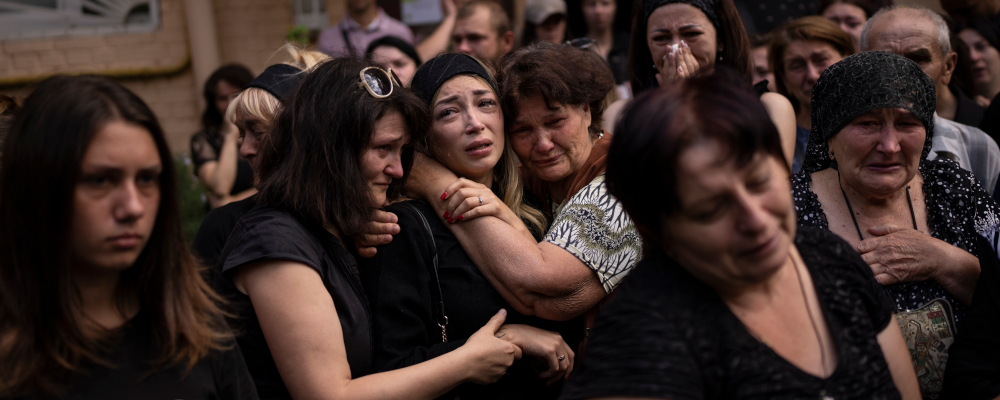Review of: Liberalism against Itself: Cold War Intellectuals and the Making of Our Times
Author: Samuel Moyn
Publisher: Yale University Press, 2023
Whenever younger millennials and Gen-Z types complain about anxiety, I have only one thing to say. “You don’t know what it was like to grow up under the looming threat of a thousand megatons of Soviet nuclear aggression.” That usually ends the conversation. But in one notable case some years ago, it did not, and the person I was speaking to is now my wife. Anyway, the Cold War went the way of oversized beige trench coats and brick cell phones and was promptly forgotten. Young people stopped worrying about WW3 and turned to more important topics like the metaphysics of pronouns and how many genders can stand on the head of a pin.
But, something like Cold War anxiety is back. One cause is the Russian war on Ukraine and its unhinged threats to use nuclear weapons. Another, now developing, is the renewal of terrorism on a huge scale in Israel perpetrated by Hamas. The third is the belief that liberalism, the dominant Western ideology, has failed, and must soon give way to the rule of tyrants and strongmen like Putin or Xi Jinping.
Or maybe not. Some observers blame liberalism for the erosion of Western culture and institutions. In the absence of a shared culture or grand narrative to unite a pluralist society, others see an incipient war of all against all—the simmering tension between ultra-progressives and traditional Muslim communities is a case in point. Fears of such conflict may be exaggerated. And yet, even Francis Fukuyama, the high priest of liberalism, has lately denounced the two extremes of neo-liberalism and woke identitarianism as two huge dangers to contemporary liberalism that threaten to destroy it. I see merit in that assessment. It is obviously impossible to have a harmonious society in which every group and every person are completely autonomous. And so, the heavy emphasis on individual freedom at the expense of consensus and norms is bound to cause problems.

The tendency toward individual autonomy is not confined to only one political faction. The “don’t tread on me” types of the libertarian Right are very obviously extreme individualists, naturally suspicious of group consensus and hostile to government. Their highest goal is to be left alone by absolutely everyone. Woke ideologues of the Left may talk a good deal about the collective rights of oppressed groups, but their doctrine of intersectionality is a vision of individualism no less radical than that of their political opponents. Consider the ever-growing list of individualised genders and pronouns to illustrate this point. In either case, the theory of the primacy of individual self-determination belongs to the discourse of liberalism—a discourse that has lately gotten out of control.
And so, you can imagine my perplexity when I discovered that a contemporary intellectual has published a book suggesting that liberalism failed because it gave up on radical, perfectionist, and utopian visions of individual autonomy and “self-creation”. This is the thesis of Samuel Moyn’s Liberalism Against Itself: Cold War Intellectuals and the Making of Our Times. The original liberals, says Moyn, arose out of Enlightenment progressivism. They exalted reason and wished to hasten its inevitable triumph over religion and ignorance, and they preached the perfectibility of man. Theirs was a utopian, millennial vision of humanity radically improved and empowered by reason, technology, progress, and individualism. But, in the 20th century, this vision was dissolved and replaced by a far more modest and pessimistic neutrality to varying ways of life; and their vision of politics was lowered to merely securing basic rights and liberties.
Moyn describes this “failure,” as he sees it, in six chapters, each covering the life and work of a 20th-century intellectual: Judith Shklar, Isaiah Berlin, Karl Popper, Gertrude Himmelfarb, Hannah Arendt, and Lionel Trilling. Not all those people were liberals, of course, but Moyn believes that each contributed something to the liberal “foreclosing the future,” since they “abandoned the Enlightenment, stigmatized Romanticism, and dug the grave of reason in history, purging perfectionism and progressivism from liberalism’s past.”
Phrases like those recur throughout Moyn’s book almost like a refrain or chorus. And very often they make for hard reading. The liberal “dithyramb for modern freedom contrasted starkly with conservative paeans to the dead hand of the past,” Moyn says. Liberalism is haunted by “vulgarized Hegelianism.” Cold War liberalism was “intellectually distinctive even as it was poised on the precipice of other things,” and though it “might call for non-interference from the outside,” nevertheless it was “premised on interference with oneself,” and so forth.
It isn’t immediately obvious what this all means, or why it must be bad. But, for Moyn, the singular cause of the problem was the irrational fear of the Soviet Union. It was a fatal mistake, he insists, to place the USSR in the same category as Nazi Germany. Since Cold War liberals could not admit cruelty and immorality as means to utopian ends, they abandoned “any notion that the furtherance of a better future functioned as a justification for immorality now.” And so the fear of totalitarianism forced Cold War liberals to conclude that “the liberalism they had inherited required drastic renovation: a break from the liberal past was required for liberal survival.” Somehow this retreat opened the door to the right-wing neoliberal and neoconservative triumphs beginning in the 1970s.
I find these assertions extremely strange—not least because Moyn’s meaning is unclear. What does he mean by “immorality” and how would it have helped to secure a better future in the West? The same goes for “cruelty.” Moreover, what utopian goals should have been pursued in the 20th century? And why were fear and suspicion of the USSR unjustified? Moyn has no answers to these questions.
More fundamentally, Moyn begs the question about the failure of liberalism. First of all, I really struggle to understand how someone can look at the contemporary West and conclude that things went wrong because the dominant ideology was insufficiently utopian and perfectionist. The vision of a world of total racial, social, sexual, and economic equality and that of radical deregulation, borderlessness, and limitless economic expansion are equally perfectionist and utopian. The subprime mortgage crisis can be analysed as the triumph of utopian thinking over reality and experience. The theory of spreading liberalism by the sword in Iraq, Afghanistan, and Libya was utopian, as was the idea of converting the Chinese to liberalism through offshoring and trade. The dream of an immediate end to the use of fossil fuels is utopian. The fantasy of an ever-growing and ever-rarefied spectrum of sexual and gender identities in need of liberation is utopian. And so is the right-libertarian demand for a world without government.
Second, liberalism has obviously not failed—at least not in the way that Moyn assumes. Even Patrick Deneen, perhaps the most vehement critic of modern liberalism, ascribes many contemporary problems to the success of liberalism. This seems at first like a paradox, given that Deneen’s famous book was called Why Liberalism Failed. But the idea is that liberalism has fulfilled its promise of individual freedom from what J. S. Mill called “despotism of custom” to the point of personal isolation and the destruction of culture. Along the way, liberalism has done much to make the contemporary West the freest, most prosperous group of societies that have ever existed. The modern welfare state, however frustrating or imperfect, was a successful creation of liberalism. The degree or extent of that success can be debated, of course, but I do not see how the mere fact of success can be doubted. Moreover, neoliberalism and neoconservatism arise not from outside, but from within the logic of classical liberalism’s emphasis on personal autonomy, limited government, and supremacy of market forces.
Accordingly, I found it impossible to accept Moyn’s premise. And yet, I wanted to find out where he was going with it, and what conclusions he would draw; and so it was equally impossible for me to put the book down. The conclusion, alas, was bewildering. Liberalism, says Moyn, must free itself from “the entanglements that were invented or intensified during the Cold War years,” and it will have to re-incorporate some of the nineteenth-century impulses purged and left behind in the Cold War years, in particular its commitment to the emancipation of our powers, the creation of the new as the highest life, and the acquisition of both in a story that connects our past and future.
“How much further can ‘self-creation’ go?”
The task for liberals in our time is to imagine a form of liberalism that is altogether original. If they don’t, it does not seem likely they will see their creed survive—and anyway survival is not good enough.
So liberalism should both recover its older impulses and be entirely original and new? This does not make sense to me. One or the other seems possible, but not both. Looking backward into one’s own tradition seems like a good idea, but if liberalism could look back to the 19th century, why not go further? Why shouldn’t contemporary liberalism be informed by much older, perhaps mediaeval or classical, ideas of liberty and autonomy? Looking into the future is less appealing. If liberalism rededicated itself to a perpetual quest for novelty, how would this be the basis for a durable polity? As long as pursuing novelty also means abolishing what is old, the main result will be confusion and instability, and there will be no story connecting past and future whatsoever.
On that last point, the 20th-century critique of Enlightenment perfectionism is obviously right and should not be brushed aside. One can admire (as I do) the sense of clarity and precision valued by the likes of Hume, Montesquieu, Voltaire, and Gibbon. But doctrines of the perfectibility of man, the supremacy of unaided reason, the “compulsion to be free,” and so forth are dangerous and have always led to one form of tyranny or another. The theory of the General Will as the source of political legitimacy is as clearly articulated in Rousseau’s Social Contract as in Hitler’s Mein Kampf. Only the wording is different. Moreover, the hideous idea of a clean and efficient method of destroying “an entire nation if necessary” first arose in reaction to the failure of public burials to keep pace with the guillotine. The words I quoted are from the History of the French Revolution by Jules Michelet (1798–1874) who describes this “empire of death” in some detail. A Parisian architect, says Michelet, appealed to Enlightenment sensibilities and suggested to the revolutionary government a system of chemical poisoning and incineration—a method that was actually implemented about 140 years later at the Nazi death camps. Such examples should give us pause before embracing the Enlightenment and its legacy without criticism.
But Moyn doesn’t agree. He assumes that constant novelty, “self-creation,” and “emancipation of our powers” are not only possible but also desirable. Like the Marquis de Condorcet, he rejects the idea, or (as I would say) the very obvious truth, that there are limits imposed upon humanity by custom and nature. He accordingly bemoans the influence of Freud upon Cold War liberals, especially upon Lionel Trilling—not only the Freudian notion of the “Unconscious” as a reason to be circumspect about human motivations, but also the idea that repression of instinct is necessary for civilised life. Freud’s 1929 essay Das Unbehagen in der Kultur is conventionally called Civilisation and its Discontents in English, but a better translation would be The Unease in Civilisation.
Now, I’d like to think I know a thing or two about civilisation, and Freud’s arguments about its origin, the mastery of agriculture and fire, and so on, border on the ridiculous. And yet the main thesis is sound, namely that social life requires the renunciation or redirection of primitive aggressive, sexual, and appetitive drives. So is the idea that there is a tension—an unease—between the desire for individuality and the need to conform to the demands of society. Anyone who remembers growing up, or who is familiar with the struggles of raising young children knows both these truths.
Finally, I would say: look around you, and ask yourself whether the tension between individual and society seems to have improved over the last three decades or so. Those who see improvement must also notice that the triumph of the individual has come at the price of social harmony and cohesion. And it has brought with it isolation and the epidemic of loneliness. So how much further can “self-creation” go? And would it really be a good idea to try pushing it further?
Anyway, there are many people who want to tell others what to do, but few who want to be told. This is why ideas of freedom and autonomy will be with us for some time, and why liberalism still has a future. It may even be a bright future, as the autocracies of Putin and Xi Jinping falter and, maybe, collapse. But Cold War anxiety is back. The world is growing increasingly dangerous and unstable. There will be little room for utopian visions and more for hard-headed realism. Western political goals will once again be measured, and politicians circumspect. Spreading the gospel of liberalism to the ends of the earth will be abandoned in favour of strengthening social and political life at home. There will be no choice. In many ways, there is much to look forward to in this new world; but utopian, perfectionist liberalism will have no place in it.
Recommended for You

‘Our role is to ask uncomfortable questions’: The Full Press on why transgender issues are the third rail of Canadian journalism

Need to Know: Mark Carney’s digital services tax disaster

Michael Kaumeyer: Polite decline: Canada’s aversion to being our best is holding us back

Howard Anglin: Lament for a Lament



